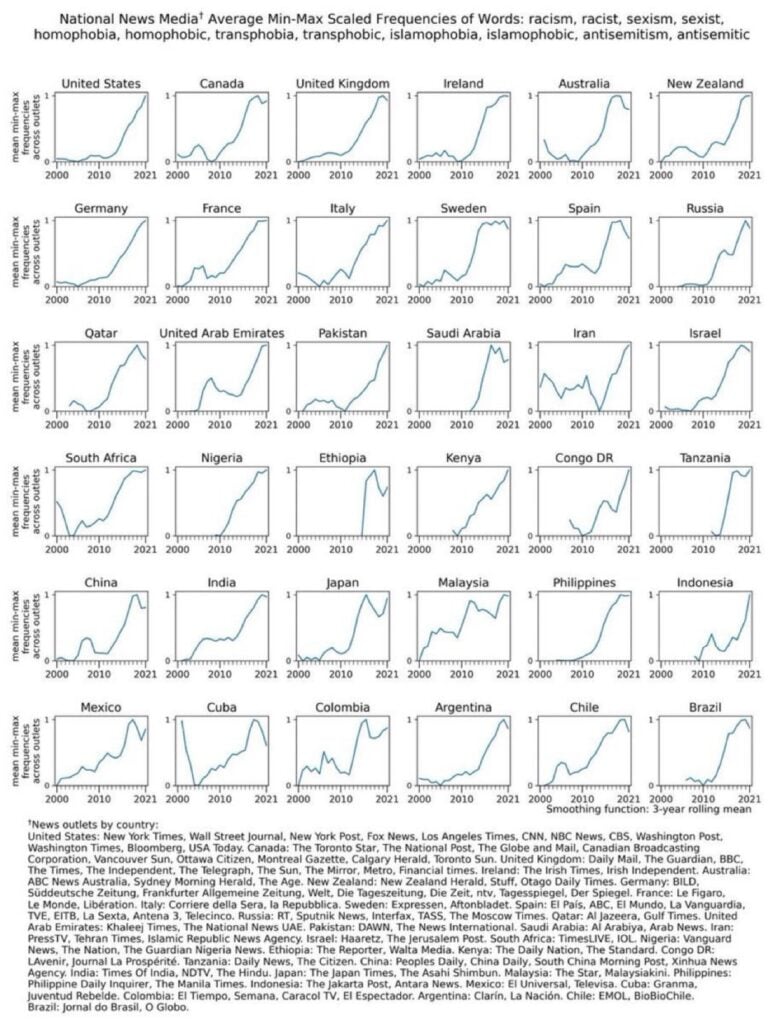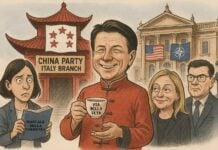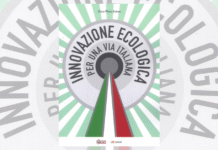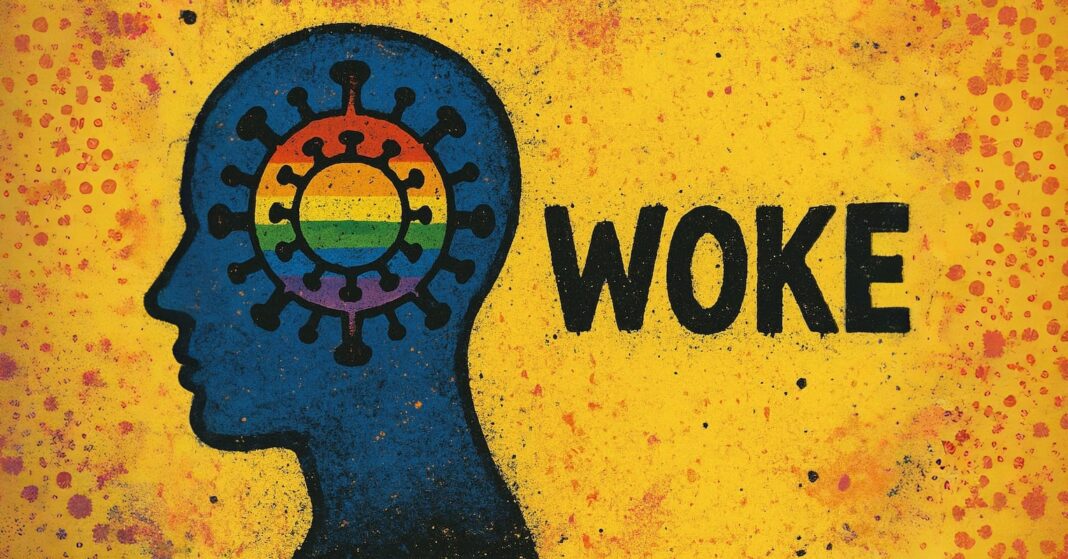There is a map that tells the story of what has happened to the language of information over the past twenty years better than a thousand editorials. It’s a chart published by researcher David Rozado, who analyzed the usage of words such as “racism,” “sexism,” “homophobia,” “transphobia,” “Islamophobia,” “anti-Semitism,” and their respective adjectival forms in media outlets across more than thirty countries, spanning from 2000 to 2021.
This is a meticulous, data-rich study, and its visual representation is striking. It shows unequivocally how, in just a few years, the woke lexicon has colonized the global press, cutting across cultural, political, and geographical boundaries like a linguistic virus.

It’s as if a switch had been flipped around 2010. From that moment onward, newspapers across the globe began using these terms with increasing frequency. Not a spontaneous or organic growth, but a sudden, coordinated surge—vertical, synchronized, and systemic.
Anglo-Saxon countries were the first to ignite the fuse—led by the United States—followed closely by Canada, New Zealand, Ireland, and Australia. Then came France, Germany, Italy, Brazil, South Africa, and even authoritarian regimes like Iran and Qatar. In a matter of years, the same vocabulary spread everywhere, as if downloaded from a centralized cultural server.
The question we must ask is simple: what really triggered this linguistic explosion? The official answer is always the same—greater awareness, civil rights, progress. But if that were truly the case, why has this “awareness” manifested in such a uniform and sudden linguistic colonization? This is not the slow, natural evolution of a mature society. This is a semantic revolution—deliberate and engineered—where words have stopped describing reality and have started distorting it.
In the United States, the data is staggering. The curves rise exponentially, in perfect sync with the spread of social media, the entrenchment of progressive ideology on university campuses, and the political polarization that followed Donald Trump’s election. The woke lexicon is no longer a descriptive tool—it’s a weapon. A new orthodoxy. A mandatory moral code.
If you don’t use those words, you’re out. If you challenge them, you’re the enemy. The press, once expected to keep the powerful in check, has become the enforcer of a new form of ideological conformity—where good and evil are dictated by hashtags and editorial policies handed down from above.
And this phenomenon is by no means confined to the U.S. The UK, Canada, Australia—these nations mirrored the pattern precisely. The narrative remains the same: inclusion, equality, respect. But the outcome is quite the opposite: exclusion for those who diverge, unequal treatment for those who think differently, and open contempt for dissent. Language has become a gatekeeper. Words are no longer tools of dialogue but instruments of submission.
In Europe, the shift has been somewhat slower, but no less relentless. In Italy, for example, the upward curve began a few years later, but it’s following the same trajectory. Terms once used with caution have become foundational pillars of every public discussion. Today, there is hardly an article, TV show, or press release that doesn’t feature at least one of these ideological keywords. They are the daily liturgy of the dominant narrative. And anyone who dares to step outside the line is immediately branded: racist, sexist, homophobe, fascist, conspiracy theorist. Debate has been replaced by denunciation. Dialogue by defamation.
But the issue isn’t the words themselves—no one denies that racism or homophobia exist. The problem is how these words are being deployed. Their omnipresence has hollowed out meaning, turning every disagreement into a moral battle between “good” and “evil.”
A young woman who criticizes a biological male competing in women’s athletics becomes “transphobic.” A professor demanding academic rigor is labeled “racist.” A father teaching his children that men and women are different is accused of “sexism.” We’re no longer in the realm of social justice. We’re in the realm of linguistic manipulation—systemic, intentional, and dangerous.
Rozado’s chart it’s a barometer of cultural mutation. It shows, with chilling clarity, that this isn’t an emerging sensibility—it’s a hegemonic project. And like any project of domination, it requires a standardized language, built around sacred words, repeated endlessly until thought itself becomes subordinate.
This is the alphabet of wokism. It has imposed itself as the new lingua franca of the West—a language in which identity holds more value than truth, victimhood outweighs responsibility, and emotion consistently trumps reason.
We could pretend nothing is happening. We could dismiss it as a passing trend. But the numbers say otherwise. This transformation has already taken root. It’s already shaping the way we write, speak, think—and above all, the way we judge others. Because when language becomes an instrument of power, those who control language inevitably control reality. Or at the very least, its perception.
Rozado’s research reminds us that we are not just changing how we describe the world—we are changing the world itself through the way we describe it. Which is why now, more than ever, we must resist. Reclaim our words. Reclaim the right to describe reality on our own terms. Because if language ceases to serve the truth, it becomes propaganda. And propaganda, no matter how virtuous it claims to be, is always a lie in disguise.































